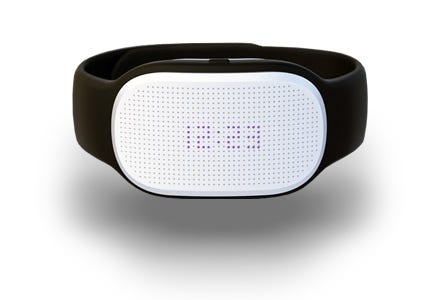Controversial Wearable Device Could Debut Soon
January 15, 2015
 The GoBe wristband is either a revolutionary device, a scam, or something in between. Its maker, HealBe (Moscow), says the device can measure caloric intake, calories burned, heart rate, stress levels, hydration levels, and sleep quality. Available for sale in the U.S. for $299.99, the brand-new device is supposed to start shipping in March. But is it for real?
The GoBe wristband is either a revolutionary device, a scam, or something in between. Its maker, HealBe (Moscow), says the device can measure caloric intake, calories burned, heart rate, stress levels, hydration levels, and sleep quality. Available for sale in the U.S. for $299.99, the brand-new device is supposed to start shipping in March. But is it for real?
While the device earned over a $1 million on IndieGogo and received considerable buzz last week at CES, it is debatable how accurate the device can live up to its maker's claim of being "the only way to automatically measure calorie intake."
The company's co-founder Stanislav Povolotsky was quoted by Pando as admitting there is a lack of hard evidence that the device works as advertised. "Proof, yeah... that is a tough piece for us," Povolotsky told Pando.
While IndieGogo had an antifraud policy in place designed to catch "any and all cases of fraud," after the chorus of people calling the GoBe fraud increased in volume, IndieGogo reworded its policy to be more lenient.
The crux of the controversy is based on its purported ability to gauge glucose levels non-invasively, and then use those to calculate caloric burn. Even measuring glucose through the skin is a challenging endeavor in itself--one that is still the subject of considerable research, as it would relieve many diabetics from pricking their fingers. It would also be a holy grail for dieters. But the logic behind using glucose to estimate caloric burn is flawed at best as well.
In an interview with Pando, the co-founder of the company Artem Shipitsin retracted the claim. "We don't measure blood sugar. We measure water balance between cells and outside cells," he said. The flawed logic behind the device is that water balance can be correlated to glucose levels, which can then be correlated to the volume of calories burned by the body.
This promotional video claims their technology is made by "top scientists." The device can purportedly automatically measure the number of calories consumed and burned throughout the day. |
But blood-glucose data have been shown to be only a rough measure of total energy intake. The biggest selling point on the GoBe wristband is its ability to automatically track the calories you eat throughout the day, without manually inputting the foods you eat. However a growing number of doctors and scientists maintain that blood-glucose readings would be an inconsistent barometer at best when measuring caloric intake. And that's just the tip of the iceberg when it comes to red flags.
HealBe says that the wristband is not a medical device and that its claims about accurate fitness level readings are based on a study involving a grand total of five people measured over five days, according to their published test results. Despite some experts citing that there is no good way to relate the presence of glucose in your cells and blood to total caloric intake, HealBe insists that they have developed an algorithm that can do exactly that.
The genesis of the project began in 1999, when a team of scientists at a Russian company called Algorithm began developing a device that can monitor glucose levels without drawing blood, a technology that medical laboratories have been trying to crack for decades without much success.
After four years and over 500 tests, the company claimed to have solved the equation, despite no public record of the aforementioned tests. In 2012, HealBe acquired the technology before using a "stream of mathematical models" to adapt the device to monitor caloric intake. Unfortunately, some of the company's loudest critics say the device requires too little effort to be taken seriously. If the company's claims were true, the device would forever change the way people diet and monitor glucose levels. Nonetheless, HealBe maintains that its algorithms can measure calories with 86 percent accuracy, despite protests from doctors and scientists that a correlation between glucose levels and calories does not exist.
So where does this leave the consumer? There was a myriad of different devices unveiled at CES 2015 last week, including several fitness trackers that weren't unveiled under a cloud of suspicion. For many, the GoBe fitness tracker will continue to have question marks surrounding its validity until HealBe is more forthcoming about the science behind it all. Until then, pre-orders continue to roll in, with the GoBe scheduled to ship out soon.
Refresh your medical device industry knowledge at MD&M West, in Anaheim, CA, February 10-12, 2015. |
Kristopher Sturgis is a contributor to Qmed and MPMN.
Like what you're reading? Subscribe to our daily e-newsletter.
About the Author(s)
You May Also Like


